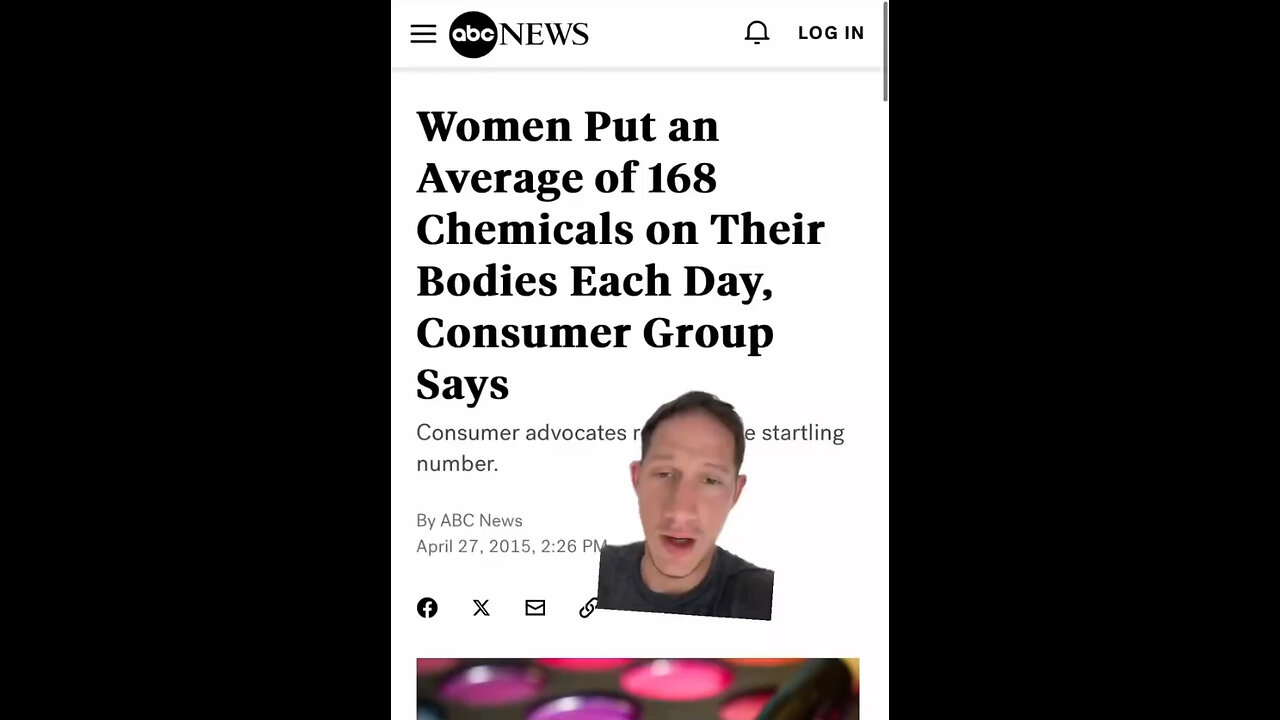Premium Only Content

The Hidden Costs of Convenience: How Mega-Corporations Shape Your Health and Choices
Every day, the average woman applies 168 chemicals to her body. This fact, reported by ABC, sounds shocking at first glance, but how does it actually happen? The answer lies not in the products themselves but in the system that manufactures, markets, and delivers these items into your daily routine. Behind the familiar scents of your favorite candles and lotions lies a web of corporate control, cheap ingredients, and decisions made far removed from your health and well-being.
Let’s peel back the layers of corporate influence, examine how decisions are really made at companies like Bath and Body Works, and contrast that with businesses that truly prioritize ethical practices. We’ll also explore how you can take back control by supporting independent, values-driven companies—or even starting your own.
1. The Real Decision-Makers: Corporate Titans Like Vanguard and BlackRock
When you buy a product from Bath and Body Works, you might imagine a creative team crafting luxurious scents and high-quality formulas. The reality couldn’t be further from the truth. 98% of Bath and Body Works’ stocks are owned by institutions, primarily Vanguard and BlackRock—the two most powerful asset management firms in the world.
How These Institutions Operate
• Control Through Appointments: Vanguard and BlackRock appoint the CEOs and leadership teams of the companies they dominate. These executives are not artisans or visionaries but business-school graduates tasked with maximizing profits for shareholders.
• Profit Over People: Product decisions are driven by cost efficiency and scalability, not consumer health. Cheaper ingredients mean higher margins, even if those ingredients are linked to health concerns.
• A System of Mutual Back-Scratching: Many of these corporations operate within an old boys’ club of secret networks and shared interests, ensuring that innovation and ethics often take a backseat to maintaining the status quo.
What This Means for You
Instead of thoughtful, health-conscious decisions, companies opt for:
• Synthetic fragrances: Linked to allergies, hormone disruption, and even carcinogenic effects.
• Paraffin wax: A petroleum byproduct that releases toxins when burned.
• Phthalates: A common ingredient in scented products, known for their role in endocrine disruption.
It’s clear: your health isn’t their priority—your wallet is.
2. How Bath and Body Works Fits Into the Bigger Picture
A Case Study in Cost-Cutting
Bath and Body Works is just one example of how major corporations prioritize profits over people. Their candles, for instance, are a mix of synthetic fragrances, paraffin wax, and undisclosed chemicals designed to maximize shelf life. But what about your shelf life?
While you’re breathing in the alluring scents of “Warm Vanilla Sugar” or “Winter Candy Apple,” you’re also inhaling volatile organic compounds (VOCs) and other toxins. These chemicals are:
• Cheap for companies to produce.
• Effective at creating strong scents.
• Known to cause respiratory issues, allergies, and even chronic illnesses over time.
The Disconnection Between Brand and Consumer
People often assume that product decisions come from the heart of the company—a founder or a passionate team. The truth is, these decisions are made in boardrooms by executives far removed from the day-to-day impact of their products on consumers.
3. The Contrast: A Company That Cares
Compare Bath and Body Works to a company like Beaver Creek Candle Company, a privately-owned American business built on principles of community and ethical production.
The Story of Beaver Creek
Beaver Creek Candle Company is a small business partnered with Hart Main, a homeschooled entrepreneur who started making candles at 13 years old. His journey began with a simple joke about candles being too “girly.” Encouraged by his mom, Hart created “ManCans” and “SheCans”, using repurposed soup cans to make candles for men. But the story didn’t stop there.
What Makes Beaver Creek Different
1. Ethical Practices:
• The soup from the cans used in their candles is donated to local soup kitchens—over 100,000 cans to date.
• Beaver Creek employs developmentally disabled workers, providing meaningful employment opportunities.
2. Transparency and Integrity:
• Beaver Creek’s candles are made with simple, high-quality ingredients—free from the harmful synthetics that dominate mainstream products.
• The company embodies a commitment to community and environmental sustainability.
3. A Purpose-Driven Model:
• Unlike corporations focused solely on profit, Beaver Creek reinvests in communities and prioritizes people over margins.
4. What You Can Do to Take Back Control
It’s easy to feel powerless in the face of corporate dominance, but as consumers, we wield significant influence. Here’s how you can fight back:
A. Do Your Research
• Investigate who owns your favorite brands. Search for the top stockholders of companies and follow the money trail.
• Look into the ingredients of the products you use daily. Are they safe? Are there healthier alternatives?
B. Support Small, Independent Businesses
• Seek out businesses like Beaver Creek Candle Company that prioritize ethics, transparency, and community impact.
• By supporting small businesses, you not only improve your own well-being but also help reshape the market.
C. Create Your Own Solutions
• If you’re passionate about change, why not create your own business? Start small—like Hart Main did—with a meaningful idea and a commitment to values.
• Explore homemade alternatives: Make candles, soaps, or skincare products using natural ingredients. Sell them online, at farmers’ markets, or through local shops.
5. The Broader Lesson: Building a Better Future
This isn’t just about candles or cosmetics—it’s about reclaiming control from systems that prioritize profits over people. As consumers, entrepreneurs, and educators, we have the power to:
• Educate ourselves and others about the realities of corporate control.
• Create and support alternatives that reflect our values.
• Teach the next generation to think critically about the products they use and the systems shaping their lives.
For example, in my homeschool business, we teach students not only about the benefits of beeswax but also about entrepreneurship, environmental stewardship, and the power of community. It’s about creating a world where ethics and innovation go hand in hand.
Conclusion: Reclaiming the Marketplace
The system that produces 168 chemicals for daily use is not accidental—it’s deliberate, profitable, and deeply entrenched in corporate interests. But the antidote is clear: education, action, and community. Whether it’s supporting companies like Beaver Creek, starting your own ethical venture, or simply choosing products with integrity, you have the power to shape a better future.
Let’s stop letting faceless corporations dictate our choices and start building a world where health, ethics, and humanity come first. As Hart Main’s story shows, it doesn’t take a billion-dollar corporation to make a difference—it starts with a single, meaningful idea.
-
 3:03
3:03
FragmentsOfTruth
5 days agoThe Paysuer Family: The Hidden Dynasty Controlling America?
2891 -
 7:41
7:41
Adam Does Movies
16 hours ago $10.17 earnedDaredevil: Born Again Review - Does Disney Do The Show Justice?
59.6K5 -
 5:06
5:06
Tundra Tactical
16 hours ago $3.85 earnedPam Bondi MUST Stop ATF's Zero Tolerance Policy NOW!
28K8 -
 18:38
18:38
The Lou Holtz Show
21 hours agoLou Holtz: "Trump Stands for America—And He Means It!" | Ukraine, Pete Rose & Common Sense 🇺🇸
48.4K10 -
 3:54
3:54
Randi Hipper
21 hours ago$100,000 BITCOIN COMING! HERE'S WHY
30K4 -
 9:34
9:34
ariellescarcella
14 hours ago"Born This Way Is A Lie" : Religious Debate
51.3K13 -
 6:05:13
6:05:13
Akademiks
18 hours agoDay 1/30. Drake Drops lawsuit vs iHeartMedia? Offset and Cardi Calls it Quits. 50 v Jim Jones?
230K14 -
 2:55:11
2:55:11
TimcastIRL
15 hours agoDemocrat TANTRUM At Trump Speech BACKFIRES, Trump Polls UP, Dems UNDER FIRE w/67Kevin | Timcast IRL
282K141 -
 1:25:23
1:25:23
Kim Iversen
17 hours agoFrom Doctor to Political Prisoner: Dr. Simone Gold on COVID Lies, January 6th, and Medical Tyranny
159K92 -
 2:09:28
2:09:28
Melonie Mac
18 hours agoGo Boom Live Ep 39!
106K16